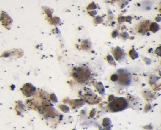
| CCC | I237 |
| PubMed | 12748652 |
| Wiki | Osteoclast |
An osteoclast is a type of bone cell that breaks down bone tissue. This function is critical in the maintenance, repair, and remodelling of bones of the vertebral skeleton. Osteoclasts are specialized cells derived from the monocyte/macrophage haematopoietic lineage that develop and adhere to bone matrix, then secrete acid and lytic enzymes that degrade it in a specialized, extracellular compartment.
The osteoclast disassembles and digests the composite of hydrated protein and mineral at a molecular level by secreting acid and a collagenase, a process known as bone resorption. This process also helps regulate the level of blood calcium.
Organism species: Mus musculus (Mouse)
| CATALOG NO. | PRODUCT NAME | APPLICATIONS | |
| Cells | n/a | Osteoclast Cells | Primary Cells Customized Service Offer |
| Extracts | n/a | Extract of Osteoclast Cells | Total Protein/DNA/RNA Extract Customized Service Offer |
| Mediums | n/a | Medium for Osteoclast Cells (If Necessary) | Cell Culture Medium Customized Service Offer |
Organism species: Rattus norvegicus (Rat)
| CATALOG NO. | PRODUCT NAME | APPLICATIONS | |
| Cells | CSI237Ra01 | Primary Rat Osteoclast Cells | Primary cells |
| Extracts | n/a | Extract of Osteoclast Cells | Total Protein/DNA/RNA Extract Customized Service Offer |
| Mediums | n/a | Medium for Osteoclast Cells (If Necessary) | Cell Culture Medium Customized Service Offer |
